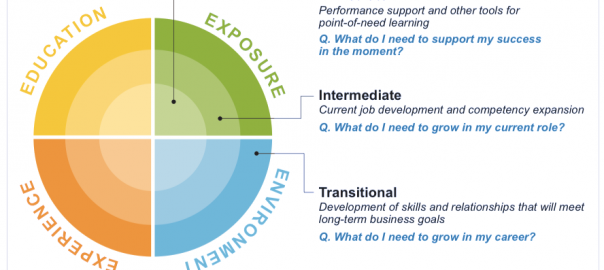I always claim that similar to the half-life of a nuclear material, knowledge also has a half-life. Depending on the industry, your knowledge half-life can last a couple of years or, for the most advanced academic or technology sectors, maybe just a couple of months. Hence, your learning curve cannot stagnant because one thing is certain:
The half-life of knowledge across any profession is shortening rapidly.
And to stay ahead you have to invest significantly.
Dani Johnson in her Bersin Research Bulletin claims that learning moves from inside-out focused learning (70-20-10 rule) to outside-in focused learning. In this, the learning itself is driven by the need for continuous knowledge throughout your career. Hence, it should reflect different types of learning needs, which would depend on whether:
- you want to improve your current performance
- grow in your role or
- ready yourself for the next step.
Simply put, your learning curve’s trajectory will be defined by the different stages and requirements of your career.

Self-Governed Learning
Google and other technology companies have taken the concept of letting employees drive informal learning to new heights. They’ve fostered an environment that has facilitated the creation of hundreds of spontaneously formed and self-governed learning groups from strategy to coding to even samba dancing. The tech world encourages and enables employees to learn together. Google’s biggest learning: don’t interfere, let it spontaneously grow, change, adapt to whatever the employee’s individual learning needs are. So get a few people together and share, teach, learn and propel your learning curve.
Social Learning
There is plenty out there on using social media for learning. One development I’m very excited about is the launch of Facebook at Work. With its exceptionally familiar user interface, it offers opportunities to significantly enhance engagement, communication, and collaboration across the organization. But more specifically, it provides an opportunity for spontaneous and informal group learning and knowledge sharing across the organization.
Become the Trainer
A cost efficient option that also provides more relevant content. But the biggest advantage of using your own staff to train others is that the person who teaches becomes the master. In my personal experience teaching is one of those practices by which helping others you help yourself. Not only does the person you teach appreciate the knowledge you share but your learning curve is impacted because you yourself become significantly better on that topic.
On-the-spot Development Feedback
Plenty of apps are starting to appear where employees are encouraged to give their coworkers, bosses or even their senior leaders on-the-spot feedback. And this is not performance feedback but specifically focused on developing the person you give feedback to. And even when you don’t use technology I feel that helping people review their experience just moments after the event has occurred is probably the most impactful and appreciated coaching you can provide.
Learn Something New
There’s been recent research on how you can keep your brain young and continue to adapt if you learn new skills. And by learning new skills I don’t mean a new technique or theory in the profession that you currently possess. No, I mean a skill that is completely new. Something like learning a new sport, a new language, playing an instrument, creating art, learning to dance or anything else that you may fancy. It could even be something academic. With sites like Coursera out there, you can pick an academic qualification from 140 institutes that cover hundreds of topics. There’s no better way to enhance your knowledge than to spice up your learning curve with a new skill.
The strive and hunger for knowledge has driven people throughout centuries to build great things. By accepting the concept of the half-life of knowledge you accept that your knowledge is depleting. And that shouldn’t be a fearful thought if you can continuously project yourself on the learning curve.
Business & Finance Articles on Business 2 Community(152)





